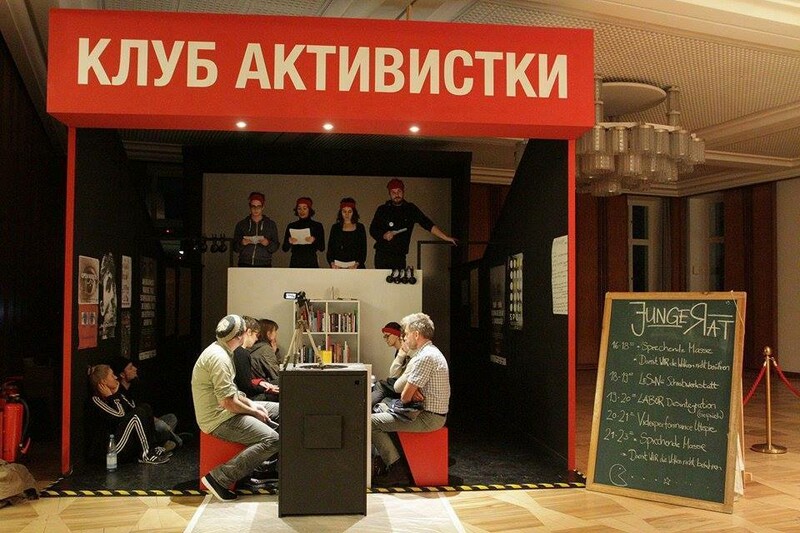Junger Rat des Gorki Forum
Works

In November 2016 the Junge Rat (youth council) convened to save Berlin. Or the theatre. Or the world? After journeying through the Gorki for their research, the youth council heads into in the de-integration laboratory to investigate the question “Is another world possible?” through five experiments. Visitors are invited to come to the Club of Activists and participate in the laboratories.
Direction: Max Czollek & Esra Kücük
Experimental Lab 1: Letters from Prison - So that we don't touch the clouds
Anyone who claims that literature depicts life is incorrect. But anyone who claims that it documents survival wouldn't be far off. Because resistance might very well be one of literature's first reflexes, and becomes all the more visible when writing in the face of violence. Writing against the inhumanity and loss of personhood in prison's loneliness and deprivation is the subject of this project. The excerpts chosen from letters from prison represent 100 years of loneliness between 1917 and 2017. The youth council reads these texts in the place yearned for by every prisoner whose voice is introduced here: the infinite space of nature, diametrically opposed to the all-too-human walls of prison.
Experiment Lab 2: The Mass That Speaks
According to the Duden German dictionary, Populismus (populism) is a “a demagogical, down-to-earth style of politics characterized by opportunism, whose goal is to win the favour of the masses by dramatising the political situation”. Who or what are these masses, and what conclusions can we draw about them? Do they amount to more than the sum of their parts?
In light of increasingly nationalised societies and radical political groups' expanding ability to mobilise their followers, the youth council is exploring questions about the structure and dynamics of human coexistence. The resulting installation, with its visual, audio and tactile elements, delves into the essence of power and explores the fluid boundary between the collective and the individual – with the help of two foundational works in mass psychology and anthropology by Gustave Le Bon and Elias Canetti.
Experimental Lab 3: The Writing Workshop
Who is allowed to write? Which perspectives are heard? Our common literary practice served as a place for debate and reflection on our collective work over the past months. It also led us to texts and authors we hadn't read for far too long or from which we had read too little. For the Autumn Salon, we have developed a format for readings that puts these different voices next to those of the youth council. If the goal is to take a position, then it cannot be the goal to formulate this position by itself, rather in an alliance with other perspectives.
Experimental Lab 4: Questions About Utopia - What do you actually hate?
In the Hate&Utopia questionnaire, the youth council poses leading questions that stimulate the responder's imagination. With the interactive experiment “What do you actually hate?”, we're attempting to approach essential complexes such as hatred or utopia in a playful fashion. During the Autumn Salon, the youth council interview team will roam the Kronprinzenpalais and confront people with these questions. Their answers can be seen live in the Club of Activists.
Experimental Lab 5: Workshop Discussion on the De-integration Laboratory
The youth council was an experiment about considering the importance of revolution and change, digital and analog politics and art, 100 years after the October Revolution. If we were a “post-migrant Berlin International”, what would we demand? Where would we begin to get rid of the system? In this workshop discussion, the youth council welcomes those who are interested to a discussion about their one-year-long work of research, reflection and discussion on the subject of “de-integration”.
The Youth Council is a project from the Maxim Gorki Theatre, in cooperation with the Schwarzkopf Foundation Young Europe and funded by the German Federal Agency for Political Education
Victoria Alexiev, student in fashion and design management, born in Halle (Saale) in 1991, raised in Hamburg. Lives and works in Milan.
Andrea Heilrath, born 1991. Lives and works in Berlin (physics, science communication, art).
Lili Horváth, born in 1991 in Hungary. M.A. in political science and culture management. Supervises international artistic projects at the Collegium Hungaricum Berlin.
Martina Poljak, cultural studies scholar and journalist, born in 1988 in Zagreb, Croatia. Lives and works between Zagreb, Vienna and Berlin.
Chantal Süss, born, primarily human, lives in Berlin.
Beliban zu Stolberg is a student in screenwriting and loves the moving image as well as texts of all genres.